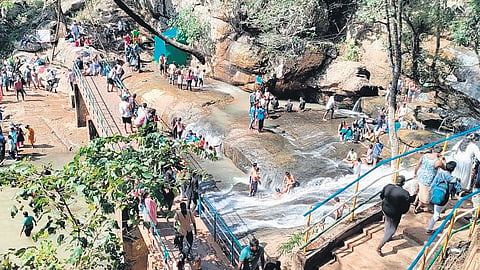

VISAKHAPATNAM: In recent years, adventure tourism to unexplored locales, including remote hills and forests, has become increasingly popular among travellers. However, this surge in exploration comes with a concerning downside. While these journeys offer excitement and discovery, they also pose a risk to both biodiversity and native wildlife.
The human footprint, evident in the form of litter and waste, not only disrupts the delicate balance of these ecosystems but also sparks conflicts between visitors and the wildlife inhabiting these areas. Several hill stations, such as Paderu, Gudisa, and segments of the Nallamalla forest region in Andhra Pradesh, have been compelled to shut their doors temporarily to address the mounting debris issue.
Yet, the question remains: Is this closure truly the solution for combating debris and safeguarding these natural havens? No. Addressing mounting concerns over the environmental impact of tourism in ecologically sensitive areas, Shanti Priya Pandey, Additional Principal Chief Conservator of Forests (Wildlife), emphasised the need for collaborative efforts between local authorities and tourists to mitigate the growing threat of plastic pollution.
“We are advising local authorities to enforce a ban on plastic within protected areas, advocating for its implementation in reserved areas,” Shanti Priya told TNIE. “For instance, in the Nagajunsagar-Srisailam Tiger Reserve, plastic bottled water has been completely banned and replaced with glass bottles. Additionally, a committee comprising representatives from Srisaila Devasthanam and local forest authorities has introduced ‘Swaccha Sevaks’ to address improper plastic disposal,” she explained.
Shanti Priya stressed the importance of collective responsibility in maintaining cleanliness and minimising garbage in these environments. “Tourists must be mindful of their actions when visiting such areas, recognising that what may appear as a tourist spot is, in fact, the habitat of wildlife that deserves a clean environment,” she remarked.
Proposing the establishment of checkpoints to monitor the transportation of plastic in hilly and reserved areas, she highlighted existing practices aimed at regulating plastic usage.
“There’s a floating directive wherein individuals are required to return any disposable items they carry upon entering and leaving the area or deposit them at the checkpoint for retrieval,” the official explained.
Efficacy depends on enforcement efforts of local governing bodies
However, the efficacy of these measures largely depends on the enforcement efforts of local governing bodies. Efforts to combat plastic pollution in these regions underscore the necessity for coordinated action and strict enforcement of regulations to preserve fragile ecosystems and protect wildlife habitats. In the progressing summer season, concerns about forest fires are increasing.
Noting this, Shanti Priya highlighted the established protocols, like the use of fire lines, followed by the forest officials.
“These fire lines act as barriers, hindering flames by removing fuel and limiting their spread. Constructed by vegetation removal, fire lines support fire fighting efforts. Additionally, ‘View Lines’ are also marked to aid accessibility and distant fire detection. Proactive measures include restricting pilgrims and tourists from carrying matchboxes and lighters into forests, confiscating them at checkpoints, and returning them later. Clear guidelines and frequent awareness campaigns educate visitors on proper conduct in forest environments, providing adaptable strategies for other regions,” Shanti Priya explained.